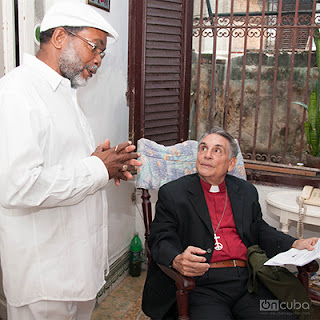The Letter of the Year is the divination performed by committees of Babalaos or high priests of Ifa (A Yoruba religion) in Cuba to determine the character of the coming year and which serves as practical religious and daily life for followers of many Afro-Cuban religions.
Fabian Flores published that the two main currents of Cuban Santeria which produced different “Letters of the Year” prophecies at the beginning of each January have announced that they will come together and make public a single version of the predictions by the popular oracle Ifa.
"At a time of political pacts and ecumenical alliances, the two groups agreed that, as of December 31 this year, only one “Letter of the Year” prophecy will be announced in Cuba, with the support of the two main Santeria groups on the island."
Lazaro Cuesta, a Babalao who is one of the founders and organizers of the commission responsible for the Letter of the Year, and Jose Manuel Perez, chair of Cuba’s Yoruba Cultural Association, joined in a press conference to announce their agreement, seen as consolidating the community of Afro-Cuban religion practitioners. The historical accord resulted from several exchanges and a final meeting, held on June 20.
"For many years, the two groups struggled to establish the supremacy of their separate oracles and released their prophecies simultaneously in Havana. Currently, in addition to those announced in Cuba, there is also the Letter made public by Babalaos who have emigrated to Miami and others in Puerto Rico, Venezuela and elsewhere"
 The existence of two bodies of oracular prophecies on the island was also a sign of the division within Afro-Cuban religions and suspicion surrounding the Yoruba Cultural Association, because of its praise for official government policy and the support received from Antonio Castañeda Marquez, the Babalao who achieved a high position within State institutions.
The existence of two bodies of oracular prophecies on the island was also a sign of the division within Afro-Cuban religions and suspicion surrounding the Yoruba Cultural Association, because of its praise for official government policy and the support received from Antonio Castañeda Marquez, the Babalao who achieved a high position within State institutions.Castañeda who passed away last year had been consecrated as a Babalao in 1965. From ostracism and exclusion he passed to official recognition and became the chair of Cuba’s Yoruba Cultural Association (with official government support) in 1991. In 2008, he was elected representative at the National Assembly of the People’s Power (parliament).
Cuesta and Perez agree that this pact seeks to avoid confusion and the lack of confidence that the two Letters of the Year were creating among believers, but note that agreement does not mean that the existence of divergent thought and postures within the religious community will be ignored. Rather it demonstrates that “one can walk down different roads while looking in the same direction,” as Cuesta explained.
Next year (2016) will start with a unified Letter of the Year, at a time when everything in Cuban society is undergoing change, including the political landscape that will develop after the end of Raul Castro’s presidential term in 2018.
Cuesta, who as noted has achieved the highest ranks in "regular" Cuban Freemasonry, is also involved in various Masonic endeavors. He recalled that "in the past we established a Masonic national school and university for the brothers who did not have the economic ability to study. Another project, the Masonic National Asylum, was created in 1918 and is the only one surviving."
There is a black mark on the history of relations between Freemasons and religions so some may be surprised that a babalawo can occupy high office in Freemasonry. Cuesta explained that even "Masons require belief in a supreme being, which we call the Great Architect of the Universe."
He added however, that "we are not allowed to express religious views within the lodges because as there are so many variants of faith that can hurt other ties and Freemasonry wants to unite its members, making links in a great chain. So we respect any belief, we accept an evangelist pastor, a Jehovah's Witness, a Muslim or a Yoruba religionist. We do not measure the faith of any of the people who are part of our institution, we believe that the most important thing is communication among men. Masonry and politics live together because the Masons are also political but must personally take a non-institutional (within Masonry). In the lodges we still have brothers who are against the system and others who support the revolution, but the institution is strengthened by the thought of all, when this is transparent and honest."
Lazaro Cuesta notes that "that there was a distiction between before and after Fidel Castro recognized that a religious person can join the Communist Party (1992). Until then be Mason constituted almost a crime. There was no law (regarding this) but we were regarded with suspicion. Today the situation has changed but still find some are recalcitrant, with a hostile attitude. But the state's relations with Masonry are today quite healthy and respectful."
Sources:
Fernando Ravsberg: http://oncubamagazine.com/a-fondo/lazaro-cuesta-lo-mas-importante-es-la-comunicacion-entre-los-hombres/
Fabián Flores: http://cafefuerte.com/cuba/24792-santeros-cubanos-sacaran-version-unica-de-letra-del-ano-a-partir-de-2016/
Julio Batista: http://oncubamagazine.com/a-fondo/gran-oriente-de-cuba-la-chispa-de-una-revolucion/






No comments:
Post a Comment